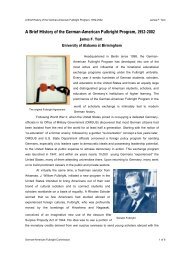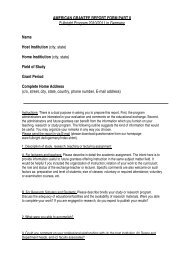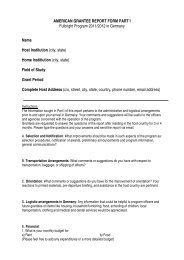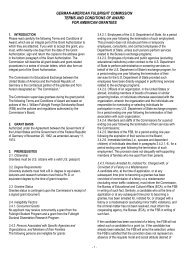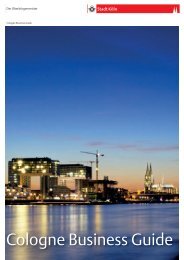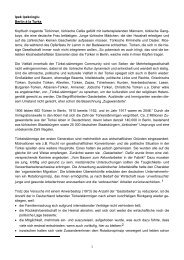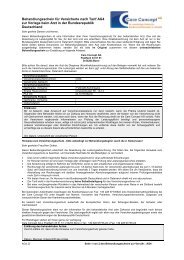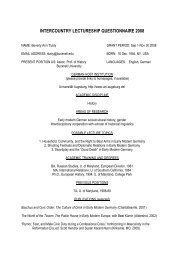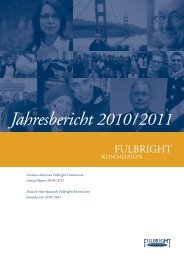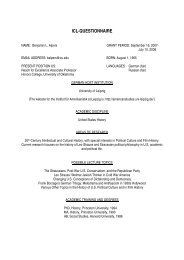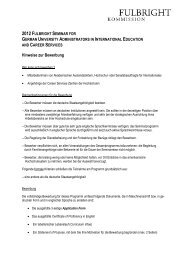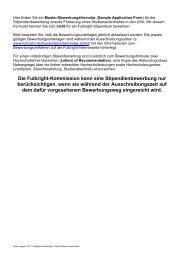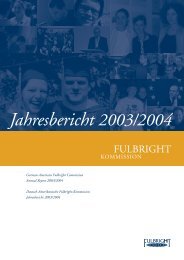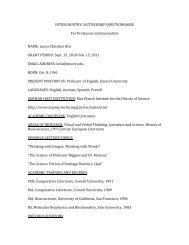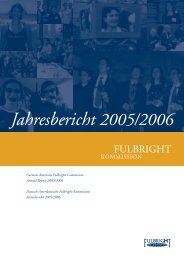Funnel 40/2, Inhalt - Fulbright-Kommission
Funnel 40/2, Inhalt - Fulbright-Kommission
Funnel 40/2, Inhalt - Fulbright-Kommission
Create successful ePaper yourself
Turn your PDF publications into a flip-book with our unique Google optimized e-Paper software.
From left to right: Karsten Voigt, Coordinator<br />
for German-American Cooperation in the<br />
German Federal Foreign Office,<br />
Prof. Riesenhuber, and John Cloud,<br />
Deputy Chief of Mission at the U.S.<br />
Embassy Berlin, in conversation following<br />
the opening ceremony<br />
In this year of European Union expansion,<br />
it is fitting that Berlin again acted as<br />
host to the event, a point hinted at by the<br />
title of the program, “Berlin Seminar 2004:<br />
Where Continents Meet.” In May, Berlin<br />
shifted from the European Union’s eastern<br />
border to its geographical heart. Indeed,<br />
nearly 15 years after the Wall came crashing<br />
down, the city has become a living laboratory<br />
to observe in a microcosm efforts<br />
at merging many different societies.<br />
This theme, in fact, was addressed in a<br />
number of the program’s events, including<br />
a talk given by Governing Mayor of Berlin<br />
Klaus Wowereit. On Wednesday, March<br />
24th, Wowereit addressed <strong>Fulbright</strong> conference<br />
attendees in the Rotes Rathaus,<br />
Berlin’s city hall. Speaking in fluent English,<br />
Wowereit highlighted Berlin’s experience<br />
in overcoming division, and pointed<br />
out its geographically central position in<br />
Europe, both of which he believes will be<br />
of crucial advantage as the EU expands eastward.<br />
“There is no better city for a discussion<br />
of a Europe growing bigger,” he said.<br />
Following his brief remarks, the Mayor<br />
took about an hour of audience questions,<br />
which spanned topics from the recent cutbacks<br />
in education spending to the problem<br />
of dog droppings on the city streets. The poor<br />
state of the city’s finances was a recurring<br />
theme throughout the questions. “It’s difficult<br />
to have a vision for a city with large financial<br />
problems,” he responded to a question<br />
about how he would like Berlin to develop.<br />
But Berlin’s fiscal difficulties didn’t deter him<br />
from burnishing his role as the capital’s<br />
cheerleader-in-chief. “Berlin is poor, but<br />
sexy,” he said, to laughter and applause.<br />
Prof. Dr. Julius Schoeps, Director of the Moses<br />
Mendelssohn Center for European-Jewish Studies,<br />
discusses the past 10 years of German-Jewish<br />
history in Berlin at the Rotes Rathaus.<br />
TITLE TOPIC 15<br />
Governing Mayor Klaus Wowereit answers<br />
questions after an address at the Rotes Rathaus.<br />
From left to right: Panelists Prof. Dr. Dietmar Herz of the University of Erfurt, Charlotte Securius-<br />
Carr, Chief of the German Program Unit of the <strong>Fulbright</strong> Commission, <strong>Fulbright</strong> Distinguished Chair<br />
Dr. Debra Minkoff currently at Humboldt University Berlin, and <strong>Fulbright</strong> Leipzig Chair Dr. Crister<br />
Garrett continue the discussion of elite universities in Germany after Monday’s panel.<br />
THE FUNNEL • VOLUME <strong>40</strong> • NUMBER 2 • SUMMER 2004



